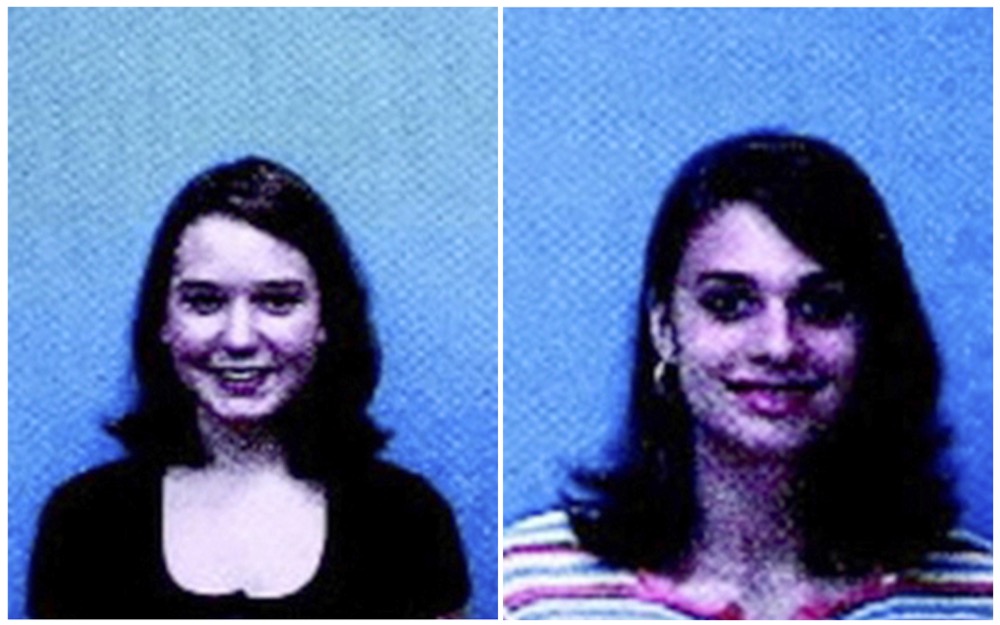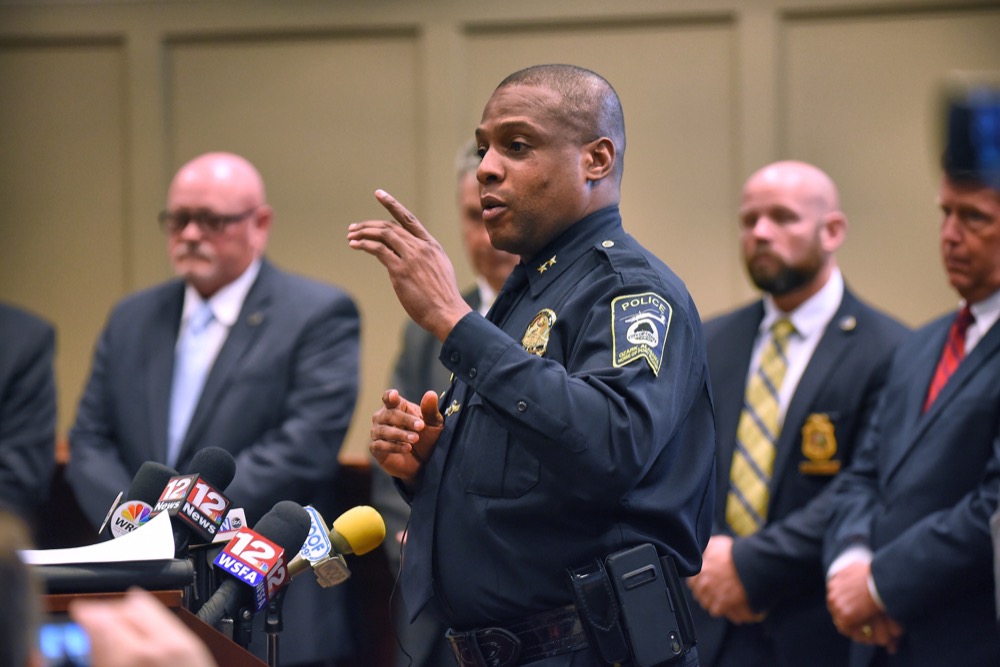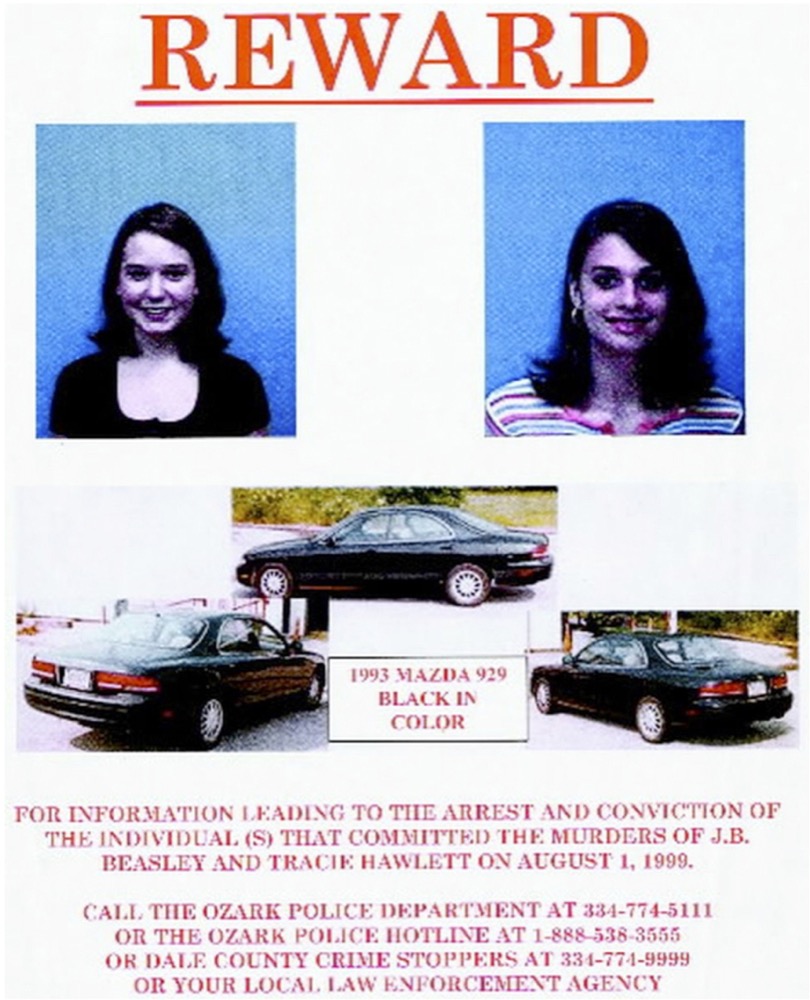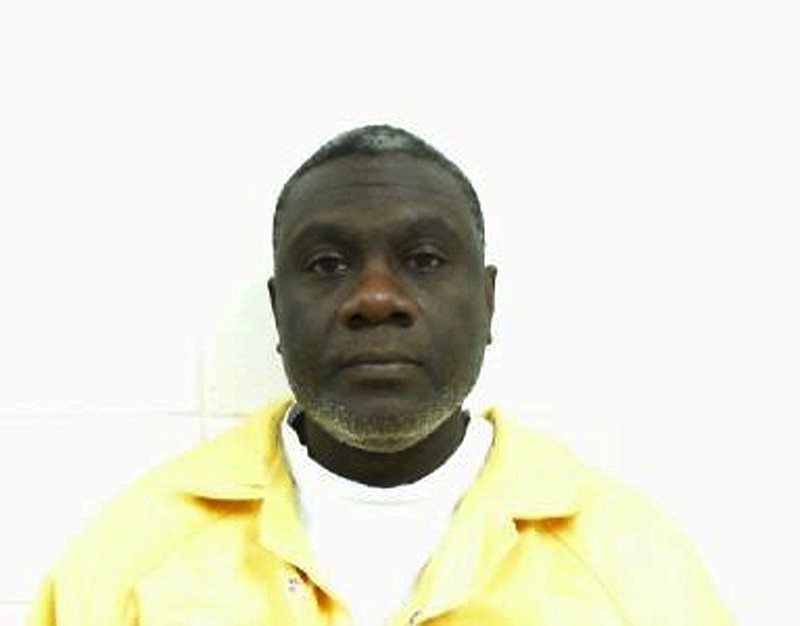 This combination of images from a 1999 flyer released by the Ozark (Ala.) Police Department, shows J.B. Beasley, left, and Tracie Hawlett, who were both murdered in July 1999. Alabama authorities say a DNA match found through a genealogy website has led to an arrest in the killings of the two teen girls nearly 20 years ago. Coley McCraney, of Dothan, was arrested Saturday, March 16, 2019, on rape and capital murder charges in the deaths of Hawlett and Beasley, according to Dale County jail records. (Ozark Police Department via AP)
This combination of images from a 1999 flyer released by the Ozark (Ala.) Police Department, shows J.B. Beasley, left, and Tracie Hawlett, who were both murdered in July 1999. Alabama authorities say a DNA match found through a genealogy website has led to an arrest in the killings of the two teen girls nearly 20 years ago. Coley McCraney, of Dothan, was arrested Saturday, March 16, 2019, on rape and capital murder charges in the deaths of Hawlett and Beasley, according to Dale County jail records. (Ozark Police Department via AP)
OZARK, Ala. (AP) - A truck-driving preacher charged with killing two Alabama teenagers found shot to death in a car trunk nearly 20 years ago was tied to the killings through a DNA match uncovered with genetic genealogy testing, authorities said Monday.
The analysis linked evidence that sat for years in a police freezer to Coley McCraney, 45, of Dothan, Alabama, police said. He now faces a potential death penalty in the killings in 1999 of Tracie Hawlett and J.B. Beasley, both 17.
Hawlett's mother, Carol Roberts, said she went numb when she heard of McCraney's arrest. She said that as the years ticked by, she began to doubt if the case would ever be solved.
"God gave her to me. He didn't have the right to do that. I just want to know why," said Roberts, who wore a button featuring her daughter's photo at the news conference announcing the arrest.
McCraney, who has his own church and preached recently, is cooperating with authorities, said defense attorney David Harrison.
"My heart goes out to the victims' families," Harrison said. "It's a tragedy. We don't need to make it make three tragedies by convicting him."
 Ozark (Ala.) Police Chief Marlos Walker comments during a press conference Monday, March 18, 2019 announcing the arrest of Coley McCraney of nearby Dothan for the 1999 slayings of Dothan teens J.B. Beasley and Tracie Hawlett. McCraney was arrested Friday and is held in the Dale County Jail with no bond. (Jay Hare/Dothan Eagle via AP)
Ozark (Ala.) Police Chief Marlos Walker comments during a press conference Monday, March 18, 2019 announcing the arrest of Coley McCraney of nearby Dothan for the 1999 slayings of Dothan teens J.B. Beasley and Tracie Hawlett. McCraney was arrested Friday and is held in the Dale County Jail with no bond. (Jay Hare/Dothan Eagle via AP)
Ozark Police Chief Marlos Walker said he knew McCraney from living in the same city and was surprised when DNA testing linked him to the slayings. He credited science, diligence, and divine intervention with the arrest.
"I'm a spiritual guy, so it was all God's work," Walker said.
The girls left Dothan the night of July 3, 1999, to go to a party but never arrived. They were found the next day in the trunk of Beasley's black Mazda along a road in Ozark, a city of 19,000 people located about 90 miles (145 kilometers) southeast of Montgomery. Each had a gunshot wound to the head.
Sherry Gilland, who lived near a convenience store where the girls were last seen, said the killings changed the community. Afterward, Gilland said, she was afraid to let her own daughter ride her bicycle or walk too far from home.
"It has been a cloud over the town, but now it's lifted," she said.
A judge had ordered McCraney to submit to DNA testing less than a month after the slayings because a woman filed suit claiming he was the father of her daughter, court documents show. But he failed to submit a sample and was ordered to pay child support.
Last year's arrest of "Golden State Killer" suspect Joseph DeAngelo in California - in which genealogy testing helped identify the suspect - helped prompt police to send their evidence to Parabon NanoLabs in Reston, Virginia, for DNA analysis, Walker said.
 This 1999 flyer released by the Ozark (Ala.) Police Department, shows J.B. Beasley, left, Tracie Hawlett, who were both murdered in July 1999. Alabama authorities say a DNA match found through a genealogy website has led to an arrest in the killings of the two teenage girls nearly 20 years ago. Al.com reports Coley McCraney, of Dothan, was arrested Saturday, March 16, 2019, on rape and capital murder charges in the 1999 deaths of Hawlett and Beasley. (Ozark Police Department via AP)
This 1999 flyer released by the Ozark (Ala.) Police Department, shows J.B. Beasley, left, Tracie Hawlett, who were both murdered in July 1999. Alabama authorities say a DNA match found through a genealogy website has led to an arrest in the killings of the two teenage girls nearly 20 years ago. Al.com reports Coley McCraney, of Dothan, was arrested Saturday, March 16, 2019, on rape and capital murder charges in the 1999 deaths of Hawlett and Beasley. (Ozark Police Department via AP)
CeCe Moore, chief genetic genealogist with Parabon NanoLabs, said information from the crime scene DNA was uploaded to the genealogy database called GEDmatch, where people voluntarily submit their own information while searching for relatives.
Moore said they were able to identify an extended family, meaning at least one relative of McCraney had voluntarily submitted DNA.
The police chief said the genealogy work identified a family, and then investigators "ultimately narrowed it down to a single person." He said they then obtained a DNA sample from McCraney and the state crime lab matched it to that found at the 1999 crime scene.
District Attorney Kirke Adams said he would seek the death penalty against McCraney. The multiple capital charges against McCraney include one of killing Beasley during a rape, he said.
A different suspect was previously cleared after his DNA didn't match semen found on Beasley.
Harrison, the defense lawyer, said McCraney is an outstanding community member who is married with children and grandchildren. Aside from preaching, records show he worked as a truck driver for years for several different companies.
The slayings haunted the community for years and Harrison said he was concerned about his client getting a fair trial.
"It's going to be difficult to find a jury that's not already aware of the facts," he said. "I might have to ask that it be moved to another venue to get a fair trial. A lot of emotions are flying."
Hawlett had two elementary school-age brothers at the time of her death and Roberts said the whole family slept in the same bed for a time after the slayings out of fear.
Roberts said her daughter, who wanted to be a doctor since she was a little girl, would have been 37 this month.
She still remembers her last conversation with her daughter, who called to see if Beasley could spend the night with them and attend church the next day.
"Last words out of her lips were, 'Mama, I love you,'" said Roberts. "Last words out of my mouth to her were, 'I love you.'"
